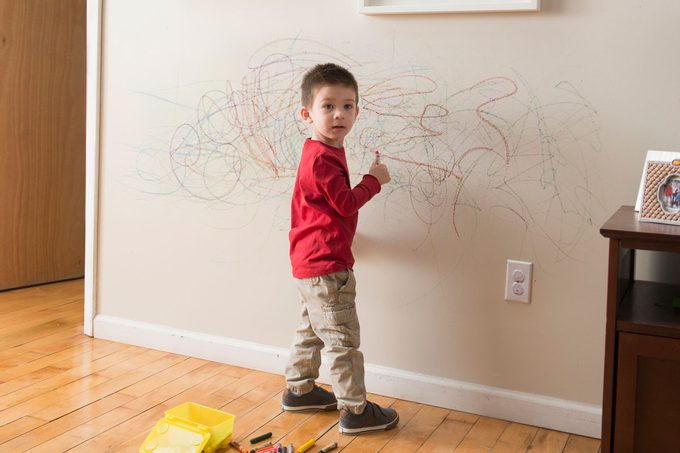If it seems like your kids start to misbehave whenever you walk in the room, you're not alone. There's even pretend science to back up your perception.

Here’s Why Kids Behave So Much Worse Around Their Parents

Even the best-behaved children can turn into monsters when Mom or Dad is in the room. (Except French children, who are, apparently, always well-behaved). But it took a fake study from Mom News Daily to get people talking about why kids act out with their mom. The faux study quickly went viral thanks to its un-scientific-sounding title: “Children are 800% Worse When Their Mothers Are In the Room.” While it’s impossible to quantify exactly how much worse kids act out with mom or dad, experts agree the premise is true—and there’s actually a good reason for it. Read on to find out why your well-behaved child is more likely to act out when you are around.
Get Reader’s Digest’s Read Up newsletter for more parenting, humor, cleaning, travel, tech and fun facts all week long.
Why do kids act out with their parents?
Experts say there are three main reasons why children act out more with their parents.
- They feel safe. “Kids push boundaries, have meltdowns, and are so much worse around their parents because they feel safe and secure with their parents,” explains Crystal I. Lee, a licensed psychologist with 15 years of experience in the mental health field, many of which have been spent working with children and their parents. “Think about your own behavior,” she says. “You probably act more put together and formal around strangers because you’re not sure how they’ll react to you. But around your friends and family, you are your true authentic self and feel safe that they love you, even if you’re having an off day. Your kids are the exact same way!”
- They’re seeking attention. “Kids will often display more extreme behavior when trying to get something out of us,” says Steve Silvestro, MD, FAAP, a pediatrician and host of “The Child Repair Guide Podcast.” “Our kids love us and crave our attention … and even negative attention is better than no attention at all.”
- Our own lack of consistency. “The more interesting reason,” according to Dr. Silvestro, “is that we as parents are more inconsistent with our responses than many other adults in our kids’ lives.” For example, teachers have to take care of many kids at the same time, so as a matter of survival, they’ll adhere more consistently to rules and routines and offer less leeway than parents when it comes to bad behavior. A child who is told to stop doing something three times before the parent finally makes him stop learns that, although sometimes his behavior won’t be tolerated, other times it will be, and this makes the bad behavior more difficult to extinguish.
What should you do?
If you notice your child misbehaving more around you than other adults, first understand that it’s normal, and as long as they’re not being destructive or violent, it’s OK to embrace those big emotions. “When children allow themselves to behave badly, they’re also allowing themselves to be vulnerable, and we should make room for that because it encourages closeness, security, and strength,” says Claudia Luiz, a psychoanalyst with more than 40 years of experience and a mother of two herself. For the times when you need your kids to behave with at least some measure of decorum, such as when you take them out for a meal, make sure you set the behavior expectations and are consistent with the consequences so they know what to expect. The other option? Just move to France.
About the experts
|
Why trust us
At Reader’s Digest, we’re committed to producing high-quality content by writers with expertise and experience in their field in consultation with relevant, qualified experts. We rely on reputable primary sources, including government and professional organizations and academic institutions as well as our writers’ personal experiences where appropriate. We verify all facts and data, back them with credible sourcing and revisit them over time to ensure they remain accurate and up to date. Read more about our team, our contributors and our editorial policies.
Sources:
- Crystal I. Lee, licensed psychologist at LA Concierge Psychologist in California
- Steve Silvestro, MD, FAAP, pediatrician and host of “The Child Repair Guide Podcast”
- Claudia Sheftel-Luiz, PsyD and author of The Making of a Psychoanalyst: Studies in Emotional Education


















